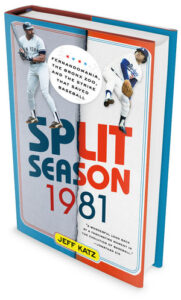Baseball owners’ lockout has roots in 1981’s “Split Season”
 It’s late February; by now, baseball fans everywhere should be celebrating the return of pitchers and catchers to their Spring Training homes across the warmer climes of Florida and Arizona and eagerly awaiting the first at-bats of the exhibition games that prepare major leaguers for the 2022 regular season.
It’s late February; by now, baseball fans everywhere should be celebrating the return of pitchers and catchers to their Spring Training homes across the warmer climes of Florida and Arizona and eagerly awaiting the first at-bats of the exhibition games that prepare major leaguers for the 2022 regular season.
Baseball fans are, instead, reliving that disconcerting, Groundhog Day-type doubt that the season will begin on time thanks to the lockout owners began on December 2, 2021. Major League Baseball (MLB) comprises the ballclub owners; they’re currently negotiating with the Major League Baseball Players’ Association (MLBPA) on a wide-ranging agenda of conditions that fans hope will lead to a new collective bargaining agreement in time for the new season. The owners reportedly consider February 28 as the latest the two sides can reach an agreement without delaying Opening Day, currently scheduled for March 31.
For Cooperstown, the work stoppage brings back memories of past labor strife that brought the game to a standstill. Former village mayor Jeff Katz, author of “Split Season,” the 2015 book examining the 1981 MLBPA strike that shut down the game mid-season, said a prolonged work stoppage can hurt.
“Historically, labor stoppages have hurt Hall of Fame attendance,” he said. “It really took a dive after the big strike in 1994.”
Despite the parallels between this year’s owner-instituted lockout and the 1981 ‘split season’ described so thoroughly in his book, Mr. Katz noted new factors driving visitor draw to Cooperstown.
“You’ve got people coming here specifically for Dreams Park,” he said. “A baseball strike or lockout isn’t going to keep them away. They come to town to play ball and they want to visit the village.”
Both Mr. Katz and current Mayor Ellen Tillapaugh said the village is looking forward to the Baseball Hall of Fame’s 2022 induction weekend, set this year for July 23 and 24.
“Hopefully the lockout is resolved before it impacts the baseball season,” Mayor Tillapaugh said. “But with the baseball camps fully running, Boston Red Sox’s David Ortiz being inducted, and people ready to travel, I think we will have a very good tourist season even if there is a lockout.”
Mr. Katz said it’s not out of the ordinary for the general public to blame the players’ union for this or any other season-halting action.
“The public perception was to blame the players at the time when the top players made one million or $500,000 or $50,000 or $10,000 in a season,” he said. “Pro athletes, especially baseball players, are always subject to the notion from a guy in the stands who says, ‘Oh, I could have done that,’ or ‘You’re out there playing a game and getting paid a lot more than you should.’”
“This lockout is completely the owners’ doing,” he said. “They’re the ones who said ‘we’re going to shut this down’ and just stopped talking to the players for 60 days.”
The MLBPA strike in 1981 put the season on hold from June 12 to July 31 – including, as Mr. Katz writes in his book, cancellation of that year’s Baseball Hall of Fame exhibition game at Doubleday Field. The strike came to an end after Association leader Marvin Miller – enshrined posthumously in the Baseball Hall of Fame in 2020 — kept players unified and on-point throughout tense negotiations that found owners splitting among themselves as the stoppage wore on.
“Owners tend to be a lot more disunified,” Mr. Katz said. “The New York Yankees stand to lose a lot more in television and cable revenue than, say, the Seattle Mariners. The Chicago Cubs have built up Wrigleyville, the neighborhood around Wrigley Field, with hotels and restaurants. These guys all have their pockets of interest. They can’t afford to lose a lot of money when the season shuts down.”
He pointed to a quote in his book from Baseball Hall of Famer Tom Seaver who, in 1981, said, “The owners are taking a very destructive position; it’s very disturbing. If they are trying to alienate the players, they are doing a great job. But they are working with competitive individuals.”

